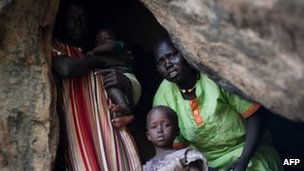The Power Behind Awareness and the Effects of Our Concern
SUDAN & SOUTH SUDAN
“It is a sad day for freedom fighters everywhere. For the Sudanese people, we have lost a champion and an ally, a person who fought along side us for liberty, human rights, and the right to live with dignity. Congressman Payne will be greatly missed.”
– Omer Ismail, a Sudanese activist on Darfur and a senior advisor to the Enough Project.
As we mourn our loss of U.S. Rep Donald Payne this week we also commemorate his unwavering commitment to public service at home and abroad. As the highest ranked Democrat on the House of Representatives Foreign Affairs Subcommittee on Africa, Global Health, and Human Rights, Rep. Payne worked tirelessly to protect human rights and provide humanitarian aid to developing countries, particularly in Africa.
But as we say goodbye to Payne’s life, we carry hope that his legacy lives on. Congressman Frank Wolf (R-VA), a longtime advocate for Sudan and co-chairman of the Tom Lantos Human Rights Commission, just returned from a trip to South Sudan to continue their shared efforts. On his sixth visit to Sudan, Wolf urges international action to curb the ongoing abuses and ethnic cleansing in Sudan/South Sudan.
“I felt it was critical to see with my own eyes what was happening and then shine a bright light on this unfolding humanitarian crisis,” Wolf said.
DEMOCRATIC REPUBLIC OF CONGO
Fresh attacks on civilians by the Lord’s Resitance Army (LRA) have been reported this week in the territories of Dungu, Faradje, Watsa, Niangara, Bondo and Ango in the DRC. The fresh attacks have caused 3,000 people to flee and live in harsh makeshift settlements with lack of clean drinking water and basic sanitation facilities. There have been 20 new attacks since the beginning of this year.
“The attacks by LRA in DR Congo are almost on a daily basis and have increased after UPDF withdrew from DR Congo in November last year, leaving a security vacuum.” -UPDF operations commander in Central African Republic and South Sudan, Col. Joseph Balikudembe
Displaced Congolese are constantly threatened, tortured, and killed by various groups and militiamen, who accuse them of collaborating with one armed party or another. The UN High Commissioner for Refugees (UNHCR) voiced its concern and recently distributed basic emergency items to some 200 newly-displaced people and increase the presence of security forces in areas.
With these new attacks by the LRA in Congo, its almost a smack of much needed truth that discredits Invisible Children’s recent Kony 2012 campaign. The documentary fails to mention that the LRA, although emerged from northern Uganda has not been there for the last six years and is currently terrorizing and attacking civilians across Central Africa, including DRC, Sudan, South Sudan, and Central African Republic.
Instead of raising awareness and knowledge about LRA’s long history in the region and the larger conflict context, the campaign narrowly targets the arrest of Joseph Kony, the LRA leader, and Western military intervention in northern Uganda, providing a naive and simple blanket solution to an exceedingly complex situation in the Central Africa. I commend the campaign’s ability to gain tremendous online momentum, but I disapprove and deplore their inability to portray accurate information and apply locally pertinent and culturally sensitive solutions that serve the needs of the people they are pinpointing. For example, I think the $1,144,174.87 they have raised just this year could be better spent on rehabilitation and post-conflict recovery initiatives for the 320,000 innocent people the LRA has affected and displaced since 2008…Or helping tackle the ever-growing culture of impunity enjoyed by rebels groups and government officials.
“What that video says is totally wrong, and it can cause us more problems than help us.”
– Dr Beatrice Mpora, director of Kairos, a community health organisation in Gulu, Uganda.
As awareness over Joseph Kony is spread online , I hope we realize the effects and power of our concern and question the truth behind these issues.
BURMA
“We are outraged and deeply saddened to hear about this attempted rape and brutal attack. We hope for peace every day, but this despicable attack reminds us how far we have to go to have the rights, peace and safety our community deserves.”
– Dah Eh Kler, secretary of Karen Women Organization (KWO)
A young Karen woman was beaten, drugged and sexually assaulted by two army men while working in her vegetable garden. The incident follows other reports of human rights abuses in Karen state, including attacks on displacement camps, forced labor and looting of supplies by the Burmese army.
The Karen Women Organization (KWO) is concerned that women’s voices are being ignored in the ceasefire process, despite being specifically affected by the conflict. Last month it created a women’s peace committee, in accordance with UN Security Council recommendations, but they have not been formally invited to join the ceasefire negotiations.
The KWO is determined to gather more international support for a fact-finding mission to document incidents of violence against women. Unfortunately however, last month, the head of Burma’s human rights commission ruled out the possibility of a probe into abuses against ethnic minorities. The international community has also backed away from earlier pressure, ostensibly with a view to encouraging further democratic reforms in Burma.
This begs the question: should we tread lightly around this issue for fear of “scaring away” democratic progress in Burma or does this mean we should we pressure the government more in their quest for change?
Powered by WPeMatico
